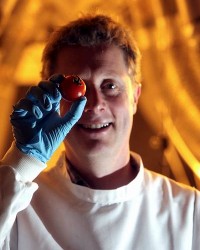Biologists at Newcastle University in the U.K. have found that exposing fruit to a blast of ozone gas can protect them against spoilage from fungus. Microbiologist Ian Singleton (pictured right) and plant biologist Jerry Barnes at Newcastle present their findings today at the spring conference of the Society for General Microbiology.
Singleton says the ozone “exerts a ‘memory’ or ‘vaccination’ effect that protects fruit from spoilage. “Understanding this mechanism,” adds Singleton, “could lead to new ways of extending the shelf life of fresh produce and reducing waste.”
The researchers found that exposing tomatoes to ozone before infecting them with fungus reduced development of lesions by up to 60 percent. This ozone treatment adds to the tomatoes’ defenses, potentially increasing the shelf-life of the fruit by two to five days. The amount of ozone used in the experiments, say the researchers, was about the same as what tomatoes would receive on a sunny day.
Fungal contamination is a common cause of spoilage of stored fruit and vegetables, with the risk of microbial contamination increasing with longer storage periods. Since the 1950s, various methods have been tried to reduce fungal combination, including heat, synthetic fungicides, and pre-packaging treatments containing chlorine or bromine.
Ozone is generally considered to be a safe replacement for pesticides because it leaves no residue and has been accepted by regulators in the U.S. as safe for fresh produce. The gas is used to improve storage of a variety of fruits and vegetables, including strawberries, grapes, tomatoes and plums, without causing any deterioration in produce quality when used in the correct way.
Read more:
- New Process Being Developed to Keep Berries Fresh Longer
- Genetic Modification Leads to Longer Tomato Shelf Life
* * *


 RSS - Posts
RSS - Posts
You must be logged in to post a comment.